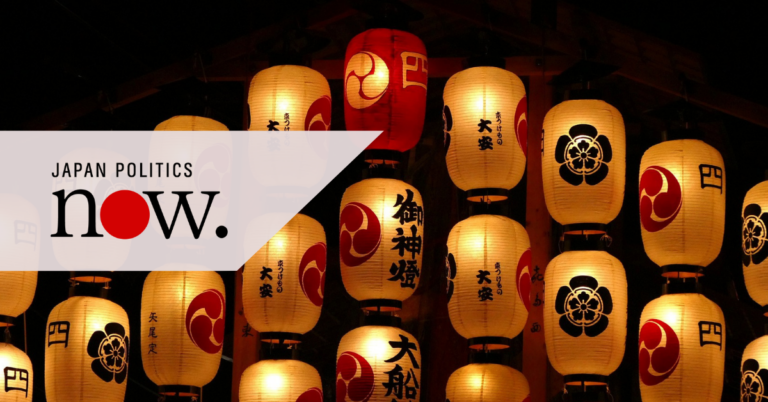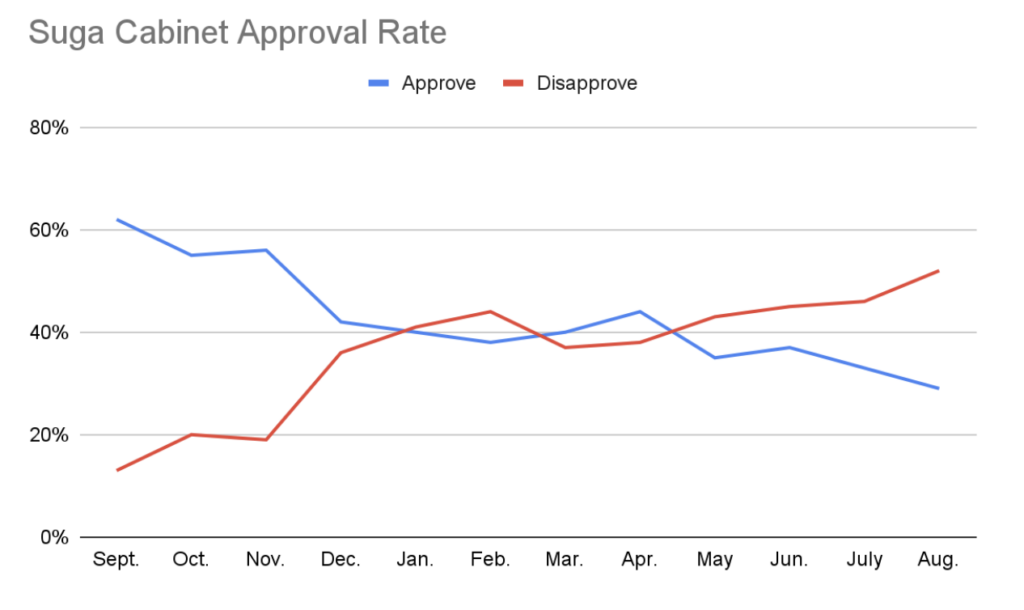
September 2021
With his poll numbers sagging, Prime Minister Suga Yoshihide is facing an increasingly complex political landscape as Japan enters the fall political season. Rivals are emerging from within Suga’s Liberal Democratic Party (LDP), and the opposition parties continue to patch over their differences ahead of the upcoming lower house election.
The timing of the upcoming election has become the overwhelming focus of Japan’s political press. The mainstream thinking had been that Suga would dissolve the lower house after the Paralympic Games end on September 5, but that is no longer certain with the extension of the state of emergency in prefectures around Tokyo. The current state of emergency will end on September 12.
But Suga’s decision is complicated by the fact that his term as president of the LDP, and thereby prime minister of Japan, ends on September 30. The party begin the election for the next party president on September 17, with a vote occurring on September 29.
Rivals are emerging to challenge Suga for the party leadership. Former Internal Affairs and Communications Minister Takaichi Sanae and LDP policy chief Shimomura Hakubun have both indicated they are eager to challenge the premier. Neither has a particularly solid power base within the party, although Shimomura could win the support of Abe Shinzo’s Hosoda faction, the largest intra-LDP faction. Former Foreign Minister Kishida Fumio is also likely to make a run for the party’s top spot.
Want to Stay Informed?
Sign up for monthly updates on the latest political developments impacting your industry in Japan:
If Suga wishes to forestall these challenges, he will need to dissolve the lower house before the LDP presidential election starts on September 17. The party would then postpone the leadership election to focus on the lower house election. The window between the end of the state of emergency (September 12) and the likely beginning of the LDP leadership campaign (September 17) will offer Suga his only chance to stave off a leadership challenge.
Alternatively, Suga may wish to face a leadership challenge ahead of a lower house election. None of the rivals to emerge thus far are particularly strong, and a victory in a leadership election would mean a more unified LDP in the subsequent general election. However, the defeat of Suga’s favored candidate in the Yokohama mayoral election has left the premier in an extraordinarily weak position, so victory in an intra-party leadership vote is not assured. The lower house’s current term ends on October 21.
Whatever his decision, this will be Suga’s first major political test as prime minister. Suga’s approval has consistently dropped since becoming premier, so he will need a convincing performance in a general election, whether before or after an LDP leadership election, to stay in the top spot. If the LDP fails to contain its losses, he may be dropped by the party shortly afterward.
Domestic Politics:
Opposition-Backed Candidate Wins Yokohama Mayoral Election

Yamanaka Takeharu, the opposition-backed candidate in Yokohama mayoral election, decisively defeated the de facto LDP candidate, Okonogi Hachiro. Voter turnout was 49.05%, up from 37.21% in the previous election in 2017.
Langley Insight: Okonogi’s loss is a major blow to Suga, who counts Yokohama as a part of his national constituency. The LDP has yet to score a single political win in an election under Suga, and the Yokohama defeat further undermines his position. The result also means this year’s lower house election will probably come later in the fall, likely after the LDP leadership election that will likely happen in late September. In addition to the politicians who have already declared their candidacy for the LDP’s top spot, all eyes are watching to see if Administrative Reform Minister Kono Taro, who is notably more popular with the public, enters the fray.
The Yokohama election also means that the proposal to develop an integrated resort (including a casino) in the city is dead in the water. Yokohama was one of four prospective sites for an IR, but Yamanaka was vocally opposed to the plan during the campaign. With the new mayor against the idea and the city assembly split on the matter, developers will not make any further progress in Japan’s “number two city.”
Opposition parties move toward greater coordination
The opposition parties continue to step up their coordination ahead of the upcoming lower house election. The Constitutional Democratic Party (CDP) and the Japan Communist Party (JCP), the two main opposition parties, have narrowed down their candidate lists such that they are competing in about 70 of Japan’s 289 single-member districts. The Democratic Party for the People (DPP), a smaller, conservative opposition party, will reportedly also sign a memorandum of understanding with the CDP to coordinate candidates. DPP leader Tamaki Yuichiro also retracted his previous criticism of the JCP, which he had called a “totalitarian” organization.
Langley Insight: The opposition has repeatedly found electoral success through coordination — first in a series of spring by-elections, followed by the Tokyo Metropolitan Assembly election, and now with the Yokohama mayoral election. The DPP’s move to join a united opposition push is significant in that Rengo, Japan’s largest collection of labor unions, will more fully support opposition candidates. Rengo is consistently anti-LDP, but it is wary of the JCP in part because of the party’s opposition to nuclear power. The opposition will become a more formidable electoral force if it receives the full institutional support of Rengo nationwide in the fall.
No political bounce for Suga after Olympics
The Tokyo Olympics have ended, and although the Paralympics are ongoing, initial polling indicates the public now seems positively disposed toward the event. 62% of respondents in NHK’s August poll said they were glad the Olympics were held, compared with 34% who were not.
Langley Insight: The Olympics have failed to produce any upward movement in Suga’s support rate, but the public seems to feel the event was satisfactorily managed. Despite some COVID-19 cases associated with the event, it is unlikely to become a political liability for the government at this point.
Foreign Affairs:
South Korean Court Approves Seizure for Wartime Labor Case

A group of lawyers representing South Korean plaintiffs in a court case over forced wartime labor said that a local court had approved the seizure of a payment intended for Mitsubishi Heavy Industries to pay for damages awarded to the plaintiffs. The company can ask for a stay of execution, so the seizure may not occur immediately. The Japanese government reiterated its position that all claims to damages were settled by the 1965 treaty that normalized diplomatic relations between the countries.
Langley Insight: This and similar court cases have dogged Japan-South Korea relations for more than a year. Tempers have largely cooled, but developments like this could reignite the diplomatic spat. South Korea President Moon Jae-in’s office said the government is “listening to opinions from various fields and having a close discussion with Japan to find reasonable ways to settle the issue, while taking into consideration the victims’ rights and the relationship of the two countries.” However, no sustainable solution to the historical issues plaguing the bilateral relationship is in sight.
Japan to Station more Defense Assets on Islands near Taiwan
Defense Minister Kishi Nobuo said that Tokyo plans to station ground-to-air and ground-to-ship units, as well as 500 to 600 troops, on the island of Ishigaki by the end of March 2023. Ishigaki is one of Japan’s southwestern-most islands, located about 300 kilometers away from Taiwan. Media reports also state that Tokyo is planning to station an electronic warfare unit on the island of Yonaguni, just 110 kilometers from Taiwan.
Langley Insight: The shift to station more military assets in southwestern Japan has been in the works for some time. However, these moves now come after Japanese lawmakers have made increasingly assertive statements regarding the defense of Taiwan. Perhaps most notably, former Prime Minister Abe Shinzo said that “what happened in Hong Kong must never happen in Taiwan,” referring to the crackdown on Hong Kong’s pro-democracy movement. Japan’s defense posture has been evolving for some time, but it seems now that the country’s advanced military capabilities are being matched by growing political will to deploy them.
NHK Polling:
The gap between the Suga Cabinet’s approval and disapproval grew in August, indicating the prime minister may be in real danger of losing his position. Polling numbers are fast approaching a point where discussion of the “Aoki formula” will become more widespread. The Aoki formula, named for former LDP lawmaker Aoki Mikio, suggests that the government will fall when the combined approval ratings of the Cabinet and the LDP add up to less than 50%. That figure is currently 62.4%, down from 67.9% in July. If the current trend continues, it could be around 50% just in time for the LDP leadership election or the lower house election.
Cabinet: 29% support (-4pp), 52% disapprove (+6pp)
Parties: LDP 33.4% (-1.5pp), CDP 6.4% (+0.4pp), Komeito 3.7% (+0.4pp), Ishin 1.7% (-0.4pp), JCP 3.3% (no change), DPP 0.8% (no change)

Langley Esquire provides a full range of government & public affairs consulting services, including policy and media monitoring, stakeholder mapping, and government relations. We craft unique solutions tailored to meet our clients’ needs across industry sectors.
If you need support in political analysis or engagement with key government stakeholders, contact us to learn more about what we can accomplish for you.
Be the First to Receive Future Updates!
See Related Content:

Public Policy Updates – August 2021
This month’s edition of Policy Radar covers developments in Technology, Energy, Telecommunications and Trade. Month focus is on the Foreign Exchange Act.

Japan Politics Now – July 2021
In Japan Politics Now, we aim to bring you Japan’s latest political developments, both foreign and domestic, and explain in brief why they matter.

Going Digital: The Future of Healthcare in Japan
In this series of articles, we examine the Japanese government’s push to transform the private sector into a technological powerhouse.
